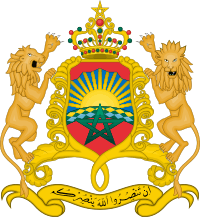Constitution of Morocco
The first Constitution of Morocco was adopted in 1962, 6 years after the country regained independence. From and following that event, the King, Mohamed V, worked for the establishment of political and constitutional institutions. This was originally the creation of the National Advisory Council and, on November 15, 1959, the enactment of the Dahir, legislation text governing public freedoms and freedom of expression. Then, in 1960, the Constitutional Council was created and the Draft of the first Constitution was proposed on November 18, 1962, and ratified by referendum on December 7, 1962 and promulgated one week later, on December 14.
 |
|---|
| This article is part of a series on the politics and government of Morocco |
|
Monarchy |
|
Government |
| Judiciary |
|
|
|
|
|
|
A referendum on constitutional reforms was held in Morocco on 1 July 2011. It was called in response to the protests that took place earlier in the year demanding democratic reforms. A commission was to draft proposals by June 2011.[1] A draft released on 17 June foresaw the following changes:[2][3][4]
- Requiring the King to name a Prime Minister from the largest party in Parliament;
- Handing a number of rights from the monarch to the PM, including dissolution of parliament;
- Allowing parliament to grant amnesty, previously a privilege of the monarch;
- Making Amazighi an official language alongside Arabic
The changes were reportedly approved by 98.49% of voters.[5] Despite protest movements calling for a boycott of the referendum, government officials claimed turnout was 72.65%.[5][6]
Following the referendum, early parliamentary elections were then held on 25 November 2011.
Results of 2011 referendum
| Choice | Votes | % |
|---|---|---|
| 9,653,492 | 98.50 | |
| No | 146,718 | 1.50 |
| Valid votes | 9,800,210 | 99.17 |
| Invalid or blank votes | 81,712 | 0.83 |
| Total votes | 9,881,922 | 100.00 |
| Registered voters and turnout | 13,451,404 | 73.46 |
See also
- Moroccan constitutional referendum, 1962
- Moroccan constitutional referendum, 1992
- Moroccan constitutional referendum, 2011
- History of Morocco#Reign of Mohammed VI (since 1999)
References
- Morocco to vote on new constitution AFP, 9 March 2011
- König will Teil seiner Macht abgeben Der Standard, 18 June 2011 (in German)
- Moroccan Islamists 'could reject constitution' AFP, 13 June 2011
- Morocco king to lose some powers, remain key figure Vancouver Sun, 17 June 2011
- Morocco approves King Mohammed's constitutional reforms BBC, 2 July 2011
- "Moroccans approve new constitution by sweeping majority". Retrieved 21 February 2016.
- "Archived copy". Archived from the original on 2011-07-29. Retrieved 2011-07-27.CS1 maint: archived copy as title (link)
External links
- Full text of the 2011 constitution in English (PDF version)
- Full text of the 2011 constitution of Morocco in Berber and Arabic
- Full text of the 1996 constitution in Arabic, English, and French
- Full text of the 1996–2011 constitution (French)
- "La Constitution - Promulgation" (PDF). Bulletin Officiel (in French) (5964 bis): 1901–1928. 2011-07-30. ISSN 0851-1217. OCLC 693771745. Archived from the original (PDF) on 2013-11-02.